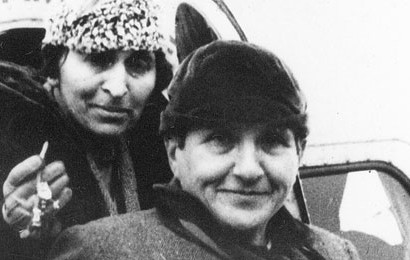Think about a memory of your own, like your first day at a job or your first date. The way you remember it is influenced by the way you experienced it; how you felt, what you smelled, how that experience informed the way you navigated a similar situation after. Now think of a memory that someone has told you, like how your parents met. In a lot of ways, you probably remember that story with a similar degree of vividness. It’s a story you can tell by heart, it makes you feel something, and it has likely informed you in some way, even though you were not actually there during the event. This memory has become one of your own, though the way that you remember it is colored by the telling of it rather than experiencing it yourself. If it’s one that stands out to you, you’ve likely drawn parallels to your own life, you were likely emotionally affected by the story, and you have your own favorite parts.
If that analogy isn’t working for you, try thinking of your high school history class. We all sat there, writing notes off the overhead projector (I just aged myself. Whoops), and trying our best to memorize a sequence of events. Now think of that one tidbit that you can actually still remember. For me, it’s the assassination of Archduke Ferdinand. I remember my history teacher describing how the limousine drove past this guy who took the opportunity to take a shot at point blank range. I remember this because he gauged the distance by relating to his position from the door, and then I thought about someone busting in the door to shoot him, which made me think of Columbine. Then I thought about the assassin, how he tried to turn the gun on himself but was stopped. I remember picturing that. I wasn’t there, but the event has become my memory, and within that is also wound the memory of hearing about the Columbine shooting.
When it came to writing Body Politic, I was faced with a lot of tough decisions. How do I write about something that existed for so many years? Who and what do I focus on? And, most importantly, how do I tell a story about something that involved a huge group of people, each of whom have different experiences, different opinions, and different memories, even of some of the same events?
Well, there were a lot of options. I could have done a Laramie Project-style fictionalized documentary by writing myself into the script, a 30-something writer learning about the events. I could have gone for the verbatim approach, influenced by my good friend Andrew Kushnir, using the words of people who were participants in the actual story, pitting their words against each other to examine how we remember and experience important events. I could have also picked one perspective and stuck to it, telling the story from that point of view entirely. It’s a testament to limitless boundaries of creative writing; the possibilities are endless.
The approach that I elected to take is what I sometimes call a historical reimagining. I’ll be honest, I haven’t put a ton of thought into that terminology, but what it amounts to is a story that is inspired by the life of the newspaper The Body Politic. It is not a documentary or history lesson, but rather the story of two original characters whose lives and actions are influenced, in one way or another, by the past. These memories, or flashbacks, or whatever, are based on events that were told to me during my many interviews, or that I read about. Predictably, every time I heard or read about an event, it was a little different. And, of course, the story is influenced by my own memory, the feelings I had in hearing it, and the parallels I drew to my own life and knowledge. So, like ol’ Franz, the memory of these events have become my own. This process has amounted to fictionalized scenes based on actual events. Conversations are imagined, characters are amalgamations of dozens of people from dozens times and places, and stories are structured in dramatically-pleasing ways. These stories, reimagined within the context of a theatrical piece, can then ripple and resonate throughout; being echoed in modern day anxiety; getting intercut with inter-generational arguments and miscommunications; and co-existing with important conversations that we are still having, or just starting to have.
So, okay, I realize that this wasn’t the safest route to take. There are those who will say (or have said) that isn’t how it happened. And given the reimagining (there’s that word again), I have no one to blame but myself. And that’s scary. The play’s about a group of journalists who also happen to be queer activists, many of whom are still alive. Intimidating doesn’t quite describe the feeling. But my decision to tell the story in this way goes beyond play structure or style. It speaks to fundamental themes of the play, which are time and memory. You have no idea how much I wish I could rip off the opening stage direction from The Glass Menagerie:
“The scene is memory and is therefore non-realistic. Memory takes a lot of poetic license. It omits some details; others are exaggerated, according to the emotional value of the articles it touches, for memory is seated predominantly in the heart. The interior is therefore rather dim and poetic.”
One may say that the difference between me and Williams (the only one, really), is that he writing from the memory of the narrator, and therefore his own, while I am writing about the memories of another, about a time that actually happened, but that I did not live through. But what I have been learning at every stage of creation is that memory and time are collective, and they are shared. In the sharing of the story is the sharing of experience, and any attempt hold exclusive ownership over a story actually serves to destroy it by distancing others. By passing it on and allowing it to exist in the hearts and minds of others, the events are occurring again, despite time.
In the end, Body Politic has become about how the story of the eponymous paper lives on today, and how it continues to become part of our shared collective memory. As it did in it’s time, it lives and breathes today, and speaks directly to where we are as a community. And that’s a true story, no matter how it’s told.
Related posts

Feminist Theatre in Canada: a History

Everything you Wanted to Know about Gertrude Stein but were too Afraid to Ask



